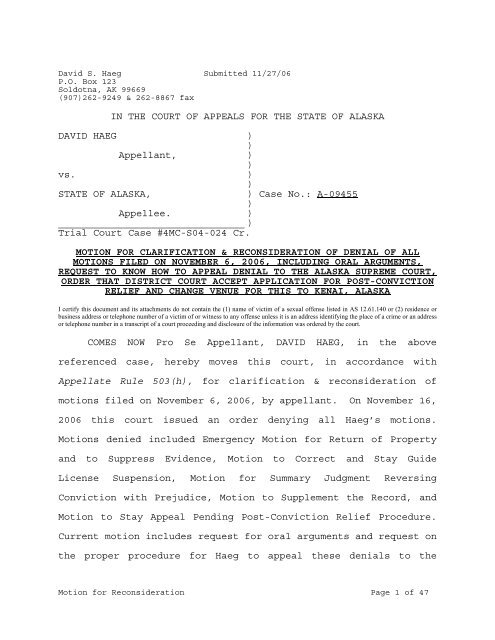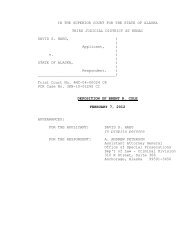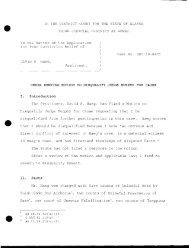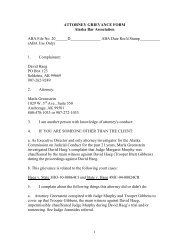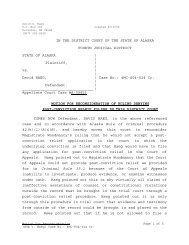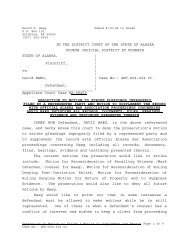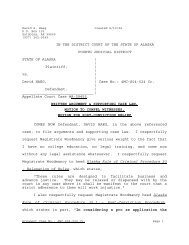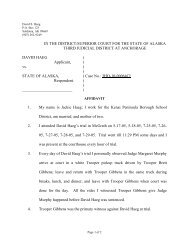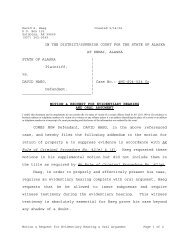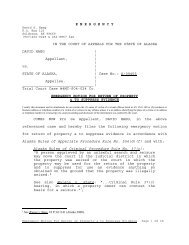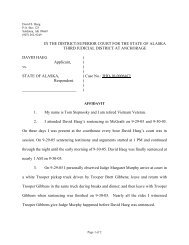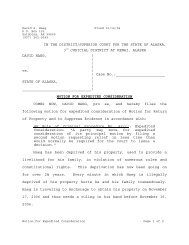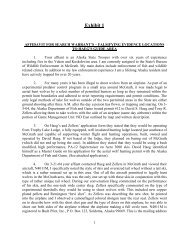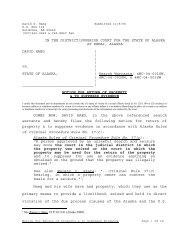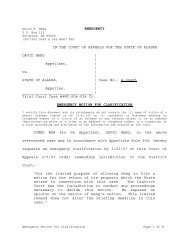112706-Motion for reconsideration - Alaska State of Corruption
112706-Motion for reconsideration - Alaska State of Corruption
112706-Motion for reconsideration - Alaska State of Corruption
Create successful ePaper yourself
Turn your PDF publications into a flip-book with our unique Google optimized e-Paper software.
David S. Haeg Submitted 11/27/06P.O. Box 123Soldotna, AK 99669(907)262-9249 & 262-8867 faxIN THE COURT OF APPEALS FOR THE STATE OF ALASKADAVID HAEG ))Appellant, ))vs. ))STATE OF ALASKA, ) Case No.: A-09455)Appellee. )________________________________ )Trial Court Case #4MC-S04-024 Cr.MOTION FOR CLARIFICATION & RECONSIDERATION OF DENIAL OF ALLMOTIONS FILED ON NOVEMBER 6, 2006, INCLUDING ORAL ARGUMENTS,REQUEST TO KNOW HOW TO APPEAL DENIAL TO THE ALASKA SUPREME COURT,ORDER THAT DISTRICT COURT ACCEPT APPLICATION FOR POST-CONVICTIONRELIEF AND CHANGE VENUE FOR THIS TO KENAI, ALASKAI certify this document and its attachments do not contain the (1) name <strong>of</strong> victim <strong>of</strong> a sexual <strong>of</strong>fense listed in AS 12.61.140 or (2) residence orbusiness address or telephone number <strong>of</strong> a victim <strong>of</strong> or witness to any <strong>of</strong>fense unless it is an address identifying the place <strong>of</strong> a crime or an addressor telephone number in a transcript <strong>of</strong> a court proceeding and disclosure <strong>of</strong> the in<strong>for</strong>mation was ordered by the court.COMES NOW Pro Se Appellant, DAVID HAEG, in the abovereferenced case, hereby moves this court, in accordance withAppellate Rule 503(h), <strong>for</strong> clarification & <strong>reconsideration</strong> <strong>of</strong>motions filed on November 6, 2006, by appellant. On November 16,2006 this court issued an order denying all Haeg’s motions.<strong>Motion</strong>s denied included Emergency <strong>Motion</strong> <strong>for</strong> Return <strong>of</strong> Propertyand to Suppress Evidence, <strong>Motion</strong> to Correct and Stay GuideLicense Suspension, <strong>Motion</strong> <strong>for</strong> Summary Judgment ReversingConviction with Prejudice, <strong>Motion</strong> to Supplement the Record, and<strong>Motion</strong> to Stay Appeal Pending Post-Conviction Relief Procedure.Current motion includes request <strong>for</strong> oral arguments and request onthe proper procedure <strong>for</strong> Haeg to appeal these denials to the<strong>Motion</strong> <strong>for</strong> Reconsideration Page 1 <strong>of</strong> 47
7/18/06. 1 Approximately every two (2) weeks Haeg and/or his wifefiled new, amended, and/or expedited Criminal Rule 37(c) motionsfirmly telling the district courts that this motion was to beruled on by them because it had to do with urgent and establishedconstitutional due process concerns in protecting the livelihood<strong>of</strong> a family – and the jurisdiction to rule on these motions wasclearly with the district courts. In addition Haeg pointed outhe was in exact compliance with the specific rule that said thesemotions were to be filed in the court in the district in whichthe property was seized or in which the property may be used. Atall times the district courts remained unpersuaded and in fact on9/26/06 Judge David Landry issued a widely distributedmemorandum, including to this court, explaining the situation,asking <strong>for</strong> advice, and trying to sidestep the issue by againclaiming the case had gone to judgment and is currently onappeal. Judge Landry further tried to sidestep and confuse theissue by claiming that Haeg was apparently only concerned with asearch warrant issued by him when in fact almost all <strong>of</strong> theproperty seized and illegally held in his district was thoughperjured search warrants issued in McGrath 2 . Both districtcourts (Aniak and Kenai) have refused to rule on Haeg’s motions –telling Haeg that they had no jurisdiction to do so as Haeg’sappeal <strong>of</strong> his criminal conviction was the jurisdiction <strong>of</strong> theCourt <strong>of</strong> Appeals. Haeg went so far as to several times in<strong>for</strong>m1 See enclosed motions included in attached appendix.2 See enclosed memorandum by Judge Landry dated 9/26/06.<strong>Motion</strong> <strong>for</strong> Reconsideration Page 3 <strong>of</strong> 47
oth Morgan Christen and Mark Wood, the sitting judges <strong>for</strong> thethird and <strong>for</strong>th districts, <strong>of</strong> the absolute refusal <strong>for</strong> anyone torule on Haeg's motion, still all to no avail and with no responsefrom any judge – even judges Christen and Wood.More recently Judge Landry issued the only order inresponse to these numerous motions – denying Haeg’s motionbecause "Subject matter and issues raised are the jurisdiction <strong>of</strong>the Court <strong>of</strong> Appeals" and "Believe this matter remains under thejurisdiction <strong>of</strong> the Court <strong>of</strong> Appeals".Haeg and his wife have been illegally deprived <strong>of</strong> theirproperty, used to provide the primary livelihood <strong>for</strong> theirfamily, <strong>for</strong> nearly three (3) years at present.After Haeg andhis wife realized this and said something they have been deniedtheir property <strong>for</strong> an additional five (5) months after repeatedlytelling the court <strong>of</strong> this injustice and asking, in exactaccordance with rule and established case law, that something bedone.The limited response so far to Haeg's motions only arrivedafter Haeg and his wife told numerous judges, including all thosein the Court <strong>of</strong> Appeals and Supreme Court, they were traveling tothe <strong>Alaska</strong> <strong>State</strong> Troopers in Anchorage to recover their property– citing all they had done in the courts according to the Rule <strong>of</strong>Law – all with absolutely no response.The <strong>for</strong>ced responsesfinally received were absurd and complete nonsense. This Court<strong>of</strong> Appeals, in refusing to rule, claims Haeg "hasn't filedanything with the district court" and the district courts, in<strong>Motion</strong> <strong>for</strong> Reconsideration Page 4 <strong>of</strong> 47
efusing to rule, claim, "We don't have any jurisdiction becausejurisdiction is held by the Court <strong>of</strong> Appeals." Because Haeg andhis wife are absolutely and irrefutably entitled to the return <strong>of</strong>their property, each court can only deny them this through thechildish and corrupt ploy <strong>of</strong> saying "we can't rule because it'snot our jurisdiction – it's the other courts jurisdiction". Yetin five (5) months, even after communicating about the issue witheach other, they refuse to do anything. It should be clear thatthe courts are actively, intentionally, maliciously and corruptlydenying Haeg and his wife their clear rights according to Rule,Law, and constitution. The courts know if they continue this longenough a pro se defendant will eventually have to give upfighting <strong>for</strong> his constitutional rights to his property, used toprovide a livelihood, and have to find another way to make aliving <strong>for</strong> his family. It is an unbelievably effective, ruthless,and chilling way to deny someone their constitutional rights –even more so when it is proven that it is being actively andaggressively utilized by multiple levels <strong>of</strong> courts.In addition if Haeg had been af<strong>for</strong>ded firmly establisheddue process in the first place it would have been proven that allthe search warrants used to seize the property were based onunbelievably intentional, knowing, and prejudicial perjury –again ending, be<strong>for</strong>e it ever started, the prosecution that hasdevastated and continues, unabated, to devastate Haeg and hisfamily.<strong>Motion</strong> <strong>for</strong> Reconsideration Page 5 <strong>of</strong> 47
to seize [property] and limits the risk and duration <strong>of</strong> harmfulerrors" that the <strong>Alaska</strong> Supreme Court requires the prosecutionmust follow. What happens to the <strong>State</strong> when they blatantly breakthis "ensemble" <strong>of</strong> constitutional protections to illegally andirreparably harm someone and put the resulting money in theirpocket? Absolutely nothing as this Court <strong>of</strong> Appeals has ruled?Why would they ever obey this "ensemble" when it is so lucrativeand there is no punishment?Did this court read Haeg's motions, memorandum, affidavitsand supporting documents? If they did they should know that the<strong>Alaska</strong> Supreme Court has ruled, "as a general rule, <strong>for</strong>feituresare disfavored by the law, and thus <strong>for</strong>feiture statutes should bestrictly construed against the government." To Haeg this means ifthe <strong>State</strong> breaks this "ensemble" <strong>of</strong> protections they have toreturn the property and cannot use it as evidence – exactly asCriminal Rule 37(c) reads and the Supreme Court ruled. How thencan the Court <strong>of</strong> Appeals, unless they are corrupt, rule that the<strong>State</strong> may still seek to <strong>for</strong>feit David and Jackie Haeg's propertythat was seized, held, and <strong>for</strong>feited in clear violation <strong>of</strong> this"ensemble" <strong>of</strong> established constitutional due process?The <strong>State</strong> never provided Haeg or his wife anything inwriting whatsoever to in<strong>for</strong>m him they were going to seek<strong>for</strong>feiture <strong>of</strong> their property. In none <strong>of</strong> the search warrants orthree in<strong>for</strong>mations charging Haeg is there a single reference tothe <strong>State</strong>'s desire or intention to <strong>for</strong>feit Haeg's property – oreven a reference to the rule allowing this. Rom even admits this,<strong>Motion</strong> <strong>for</strong> Reconsideration Page 8 <strong>of</strong> 47
stating, "Although the judgments do not reflect the statutoryauthorization <strong>for</strong> <strong>for</strong>feiture <strong>of</strong> the aircraft, and appellant doesnot directly raise this in his brief, AS 16.05.190-.195 and AS08.54.720(f)(4) authorize <strong>for</strong>feiture upon conviction. SeeWaiste, 10 P.3d at 1152-53." In other words the court <strong>for</strong>feitedHaeg's property without giving Haeg or his wife any chancewhatsoever to prepare a defense against this. This is against thelaw. In fact Federal Rule <strong>of</strong> Criminal Procedures 7 and 32.2prohibit anything being <strong>for</strong>feited if the intent to <strong>for</strong>feitproperty is not specifically articulated in the chargingdocuments. This is to ensure that the person to be deprived hasthe constitutionally guaranteed "notice" <strong>of</strong> the case against hisproperty and an opportunity to prepare to meet it. Neither Haegnor his wife ever received this guaranteed "notice" <strong>of</strong> a caseagainst their property.Is the Court <strong>of</strong> Appeals trying to convince Haeg that itdoesn't matter the <strong>State</strong> has illegally deprived him and his wife<strong>of</strong> their livelihood since the very beginning, effectivelybankrupting him and his wife, and now the <strong>State</strong> gets to startover with a clean slate and seek <strong>for</strong>feiture once again? So the<strong>State</strong> gets a clean slate but Haeg is required to keep his dirty,shattered, and bankrupt one? What, exactly, is the reasoning <strong>for</strong>this ruling? Would not constitutionally guaranteed fundamentalfairness, clearly expressed in the due process clause, require aruling exactly opposite? That Haeg gets a new, clean, andunbankrupt slate and the <strong>State</strong> gets the dirty, broken, and<strong>Motion</strong> <strong>for</strong> Reconsideration Page 9 <strong>of</strong> 47
if at least he could bond his property out the judge refused tomake a ruling – and refused to rule even after Haeg filed secondmotion asking her to rule on the first motion. The <strong>State</strong>'sargument, used to blackmail Judge Murphy not to rule, is veryenlightening; "The court will be usurping executive authority ifit allows Haeg to bond his [property]". This democracy calledthe United <strong>State</strong>s is dependent upon the checks and balancesbetween the executive, judicial and legislative. It is verychilling indeed when it is so corrupt the executive is using thejudiciary's checks against the judiciary to deny someoneconstitutionally guaranteed rights.If the <strong>State</strong> is now allowed to re-<strong>for</strong>feit Haeg's propertyor <strong>for</strong>feit the property they still possess after they weredenied <strong>for</strong>feiture by the court because it was never even used as"evidence", they will have no reason to ever follow the"ensemble <strong>of</strong> procedural rules that bounds the states discretionto seize [property] and limits the risk and duration <strong>of</strong> harmfulerrors" because it will be proven there is no punishment if the<strong>State</strong> doesn't obey these constitutional protections.II.<strong>Motion</strong> to Stay Appeal Pending Post-Conviction ReliefProcedureHaeg requests the Court <strong>of</strong> Appeals to reconsider andclarify their reasons <strong>for</strong> denying stay <strong>of</strong> his appeal until afterhis post-conviction relief procedure claiming ineffectiveassistance and corruption <strong>of</strong> counsel, prosecutorialmisconduct/corruption, and judicial misconduct/corruption is<strong>Motion</strong> <strong>for</strong> Reconsideration Page 11 <strong>of</strong> 47
finished. The court has somehow justified their action by merelystating: "the law allows Haeg to pursue an appeal and a petition<strong>for</strong> post-conviction relief at the same time". This court neveraddressed the undeniable, immense, and fatal prejudice to Haegthat doing this would cause him – all documented <strong>for</strong> them toconsider in the very motion this court denied. Also, the courtdid not claim the <strong>State</strong> would be in anyway prejudiced if Haeg'appeal was stayed.All seminal <strong>Alaska</strong>n cases, including those by this Court <strong>of</strong>Appeals involving this exact situation, have held a defendantmust first move <strong>for</strong> a new trial or sought post-conviction reliefbe<strong>for</strong>e moving <strong>for</strong>ward with an appeal claiming ineffectiveassistance <strong>of</strong> counsel. This Court <strong>of</strong> Appeals in <strong>State</strong> v. Jones759 P.2d 558 made it extremely clear: "Jones also filed a directappeal challenging his conviction & sentence on unrelatedgrounds. The appeal was stayed pending resolution <strong>of</strong> the postconvictionprocedure".See also: Barry v. <strong>State</strong>, 675 P.2d 1292: "we observedthat in appeals raising the issue <strong>of</strong> ineffectiveassistance <strong>of</strong> counsel, the trial record will seldomconclusively establish incompetent representation,because it will rarely provide an explanation <strong>for</strong> thecourse <strong>of</strong> conduct that is challenged as deficient. Weconcluded that, 'hence<strong>for</strong>th we will not entertainclaims <strong>of</strong> ineffective assistance <strong>of</strong> counsel on appealunless the defendant has first moved <strong>for</strong> a new trialor sought post-conviction relief'"Grinols v. <strong>State</strong> No. A-7349: "But many states –including <strong>Alaska</strong> – generally <strong>for</strong>bid a defendant fromraising ineffective assistance <strong>of</strong> counsel claims ondirect appeal. Instead, <strong>Alaska</strong> & these other statesrequire a defendant to pursue post-conviction relief<strong>Motion</strong> <strong>for</strong> Reconsideration Page 12 <strong>of</strong> 47
litigation if they want to attack the competence <strong>of</strong>their trial attorney".<strong>Alaska</strong> Supreme Court in Risher v. <strong>State</strong> 523 P.2d 421:"Whether counsel is incompetent usually can beascertained only after trial ... it may be necessaryto remand <strong>for</strong> an evidentiary hearing on this issue.For example, if on appeal it is contended that trialcounsel could have discovered helpful evidence, wemight remand <strong>for</strong> a hearing on that issue. In most suchcases, however, the necessity <strong>of</strong> an appeal & remandedmay be avoided by first applying at the trial courtlevel <strong>for</strong> a new trial or moving <strong>for</strong> post-convictionrelief."United <strong>State</strong>s Court <strong>of</strong> Appeals <strong>for</strong> the Seventh CircuitUS v. Fuller No. 00-2023:"We generally discourage appellants from bringingineffective assistance <strong>of</strong> counsel claims <strong>for</strong> the firsttime on direct appeal because only rarely is the trialrecord sufficiently developed <strong>for</strong> meaningful review.See United <strong>State</strong>s v. Pergler, 233 F.3d 1005, 1009 (7thCir. 2000); United <strong>State</strong>s v. Martinez, 169 F.3d 1049,1052 (7th Cir. 1999)."Why does this same Court <strong>of</strong> Appeals refuse him this whenthey require it <strong>of</strong> everyone else? Haeg wonders if this is equalprotection under law – when it is so extremely prejudicial to<strong>for</strong>ce him to proceed with an appeal based upon a nearlyworthless record and at the same time telling him if he wants toconduct a post-conviction relief procedure to supplement therecord he must do it at the same time. Yet, because his briefmust be filed be<strong>for</strong>e this is done, this new evidence will neverbe considered in deciding his appeal. Also, because he will betrying to conduct both at the same time, along with stillproviding <strong>for</strong> his family, neither the appeal nor the postconvictionrelief procedure will receive the attention each<strong>Motion</strong> <strong>for</strong> Reconsideration Page 13 <strong>of</strong> 47
needs to succeed. Is this the reason <strong>for</strong> this decision from theCourt <strong>of</strong> Appeals? That they do not want Haeg to be able toconduct an effective appeal or post-conviction relief and/orthey do not want to have on record the full truth <strong>of</strong> whathappened to Haeg be<strong>for</strong>e deciding Haeg's appeal? Haeg would liketo point out it was his counsel, who was actively representinginterests in direct conflict with Haeg's, who filed Haeg'sappeal. Haeg does not want to dismiss this appeal; he just wantsa fundamentally fair opportunity to present it.Of interest also is that nearly every court case Haeg hasfound has allowed and/or required a post-conviction reliefprocedure to finish be<strong>for</strong>e allowing an appeal claimingineffective assistance <strong>of</strong> counsel to move <strong>for</strong>ward. Theoverwhelming rational is that it is a waste <strong>of</strong> everyone'sresources – judicial, defendant, and prosecution – to conduct anappeal which cannot get to the heart <strong>of</strong> the matter because therecord is inadequate; and will have to be duplicated after therecord is supplemented. Haeg has precious few resources left –the judicial and <strong>State</strong> prosecution have unlimited resources - asthey get theirs from Haeg and every other taxpayer.The onlypossible reason that Haeg can imagine <strong>for</strong> the Court <strong>of</strong> Appealssingular treatment <strong>of</strong> him is that they are actively trying tobankrupt him and sabotage his appeal and post-conviction reliefprocedure. The only reason he could imagine <strong>for</strong> this is thatthey are actively trying to protect the <strong>State</strong>, Haeg's <strong>for</strong>mer<strong>Motion</strong> <strong>for</strong> Reconsideration Page 14 <strong>of</strong> 47
attorneys, and/or Judge Murphy from the consequences <strong>of</strong> theirunbelievable actions in Haeg's case.Haeg is also very curious if the courts will now rule thathe cannot bring a post-conviction relief procedure claimingineffective assistance <strong>of</strong> counsel, prosecutorial misconduct, andjudicial misconduct because they "could have been but were notraised in a direct appeal from the proceeding that resulted inthe conviction". Haeg thinks this would be a very effective way<strong>for</strong> this or any other court to further sabotage his appealand/or post-conviction relief procedure and keep everythingunder wraps.Haeg would also like this court to address, since it failedto do so earlier, his request, made in the motion <strong>of</strong> November 6,2006 to stay appeal, to order the district court to accept anapplication <strong>for</strong> post-conviction relief and to change the venue<strong>for</strong> this process to Kenai, <strong>Alaska</strong>. The reasons <strong>for</strong> this arealready outlined in the original motion. The trial court hasruled that it would not accept an application <strong>for</strong> post-convictionrelief from Haeg and that he would have to file such anapplication with the Court <strong>of</strong> Appeals – remaining unpersuadedeven after Haeg pointed out the rules did not allow him to filesuch an application with the Court <strong>of</strong> Appeals. This againdirectly shows the bias <strong>of</strong> the trial court against Haeg, and,along with the huge cost prejudice in conducting this procedurein McGrath, provides a sound basis <strong>for</strong> the change <strong>of</strong> venue.<strong>Motion</strong> <strong>for</strong> Reconsideration Page 15 <strong>of</strong> 47
III. <strong>Motion</strong> to Supplement the RecordHaeg requests the Court <strong>of</strong> Appeals to reconsider andclarify their reasons <strong>for</strong> denying his <strong>Motion</strong> to Supplement theRecord. Haeg has found that the court record can be supplementedwith attorney disciplinary proceedings and judicial disciplinaryproceedings but the trial court has refused to grant or evenrule on this. This Court <strong>of</strong> Appeals has also now denied hisrequest, stating "the record on appeal is to consist solely <strong>of</strong>evidence and documents presented to the trial court during theproceedings that we are being asked to review. See AppellateRule 210(a)." Yet the Court <strong>of</strong> Appeals is mistaken in this – asAppellate Rule 217, which governs appeals from district court,clearly applies. Rule 217(c) states: "Unless otherwise orderedby the court <strong>of</strong> appeals, the record on appeal shall consist <strong>of</strong>the entire district court file, together with recordings <strong>of</strong> theelectronic record designated by the parties." Haeg asks thiscourt if this means anything he filed with the district courtthen is part <strong>of</strong> the record in his case – and if not why not.Haeg also asks this court exactly how and why it is thateverything, including the electronic record and motions filed,made during Haeg's representation hearing be<strong>for</strong>e the trial courtconcerning the corruption by the <strong>State</strong> and attorney's in Haeg'scase, have been carefully and completely wiped from the <strong>of</strong>ficialcase record. Haeg points out that the trial court has refused torespond to three different and direct inquiries <strong>of</strong> this exactissue. Haeg respectfully asks how to proceed - again citing<strong>Motion</strong> <strong>for</strong> Reconsideration Page 16 <strong>of</strong> 47
<strong>Alaska</strong> Supreme Court case law established in Collins v. ArticBuilders, 957 P.2d 980 (1998), Breck v. Ulmer, 745 P.2d 66(1987), Keating v. Traynor, 833 P.2d 695 (1992), & Sopko v.Dowell Schlumberger, Inc., 21 P.3d 1265 (2001) – all <strong>of</strong> whichindicate a court should point out the proper procedure <strong>for</strong> a prose defendant to accomplish what it is he is obviously attemptingto accomplish. As indicated in his original motion, Haeg musthave all <strong>of</strong>ficial proceedings, including those be<strong>for</strong>e the <strong>Alaska</strong>Bar Association and the <strong>Alaska</strong> Commission on Judicial Conduct,made part <strong>of</strong> the record <strong>for</strong> him to obtain justice.PrejudiceUS v. Fuller, No. 00-2023 (7th Cir. Dec. 20, 2001)."Mr. Fuller also submitted documentation <strong>of</strong> agrievance he had filed against his defense counselwith the Wisconsin state bar. We granted Mr. Fuller’smotion, holding that <strong>for</strong> purposes <strong>of</strong> appeal defensecounsel had an actual conflict <strong>of</strong> interest in view <strong>of</strong>allegations made by Mr. Fuller in various pro sesubmissions to this court. Although our orderspecified that defense counsel had a conflict <strong>of</strong>interest <strong>for</strong> the purposes <strong>of</strong> Mr. Fuller’s appeal, weexpressly reserved comment on whether defense counselhad a conflict <strong>of</strong> interest at the time he argued Mr.Fuller’s motion to withdraw his plea. The Governmenthas filed a motion to strike from appellant’s openingbrief the letter discussing the grievance that Mr.Fuller filed against his defense counsel with theWisconsin state bar. This letter has already beendiscussed in our order granting Mr. Fuller’s motion<strong>for</strong> appointment <strong>of</strong> new counsel. Accordingly, we denythe Government’s motion and sua sponte supplement therecord with the letter."IV. <strong>Motion</strong> <strong>for</strong> Summary Judgment Reversing Conviction withHaeg requests the Court <strong>of</strong> Appeals to reconsider andclarify their reasons <strong>for</strong> denying his <strong>Motion</strong> <strong>for</strong> SummaryJudgment Reversing Conviction with Prejudice. If the Court <strong>of</strong><strong>Motion</strong> <strong>for</strong> Reconsideration Page 17 <strong>of</strong> 47
Appeals cannot do this Haeg, as a pro se defendant, respectfullyasks to know the proper procedure <strong>for</strong> accomplishing this – asthe <strong>State</strong> has not contested, nor can it contest, the merits <strong>of</strong>such a motion. This motion would end the gross and ongoingfundamental breakdown in justice and the adversarial system inHaeg's case – sparing he and his family from further harm.V. <strong>Motion</strong> to Correct and Stay Guide License SuspensionHaeg requests the Court <strong>of</strong> Appeals to reconsider andclarify their reasons <strong>for</strong> denying his <strong>Motion</strong> to Correct and StayGuide License Suspension. This court has ruled on the motion tocorrect that it has "the power to grant this kind <strong>of</strong> relief onlyif the trial court had no legal authority to revoke Haeg'slicense, or if the trial court was clearly mistaken in decidingto impose a license revocation as opposed to a suspension. Ineither event, we would not grant such relief until we decidedHaeg's appeal". If this court refuses to correct Haeg's sentenceuntil after his appeal, which, at the rate it is going, may beyears away, he will already have been <strong>for</strong>ced to destroy theexceedingly expensive camps - which will include burning themdown and flying out the heaters, stoves, lights, bunks, tables,etc. etc. - as required by the Bureau <strong>of</strong> Land Management because<strong>of</strong> the current license revocation. How can this court possiblychoose to ignore this obvious and immense prejudice to Haeg untilafter it happens to him – especially when the error, both legaland clearly a mistake, by the sentencing court is so clear? The<strong>State</strong> even admits this plain error is because the judgment <strong>for</strong>m<strong>Motion</strong> <strong>for</strong> Reconsideration Page 18 <strong>of</strong> 47
states "revocation" while the law states "requires the court to... suspend the guide license ... <strong>for</strong> a specified period <strong>of</strong> notless than three years, or to permanently revoke the guidelicense". How can the trial court order a five year revocationwhen the law does not allow this – with a permanent revocationthe only revocation allowed? Again Haeg asks the reason why theCourt <strong>of</strong> Appeals refuses to promptly rule so Haeg is againundeniably prejudiced so severely simply because a <strong>for</strong>m fails t<strong>of</strong>ollow the law. Haeg points to Appellate Rule 503(d) "As soon aspractical after the seven-day period [so adverse parties havetime to respond], the motion will be considered." Exactly whydoes this Court <strong>of</strong> Appeals disregard this rule in Haeg's case?To Haeg it is clear this court and its judges are abdicating one<strong>of</strong> their most basic mandates – to keep the parties from beingunjustly prejudiced (<strong>for</strong> those non-attorneys reading thisprejudiced means harmed). Haeg can see no reason <strong>for</strong> this otherthan he must be prejudiced to the extent he can no longer exposethe conduct <strong>of</strong> his defense attorney's, the prosecution, and thejudges in his case. Again Haeg points to the sworn testimony byattorneys be<strong>for</strong>e the <strong>Alaska</strong> Bar Association concerning hisrepresentation: "there would be immense [political] pressurebrought to bear on the prosecution and judge [to make an example<strong>of</strong> Haeg]". Haeg wonders if in the next round <strong>of</strong> sworn testimony"judge" will change to "judges".Haeg also respectfully asksthis court if he is allowed to sue them <strong>for</strong> the damages theirrefusal to rule "as soon as practical" will cause him. It should<strong>Motion</strong> <strong>for</strong> Reconsideration Page 19 <strong>of</strong> 47
e in the neighborhood <strong>of</strong> $100,000.00 in actual damages, althoughHaeg will <strong>of</strong> course seek additional punitive damages.Haeg has asked the trial court (Judge Murphy) to staysuspension/revocation <strong>of</strong> his guide license and this was denied atsentencing – as was already made clear to this Court <strong>of</strong> Appeals.This Court <strong>of</strong> Appeals stated it needed to know the reason <strong>for</strong>this refusal be<strong>for</strong>e it could consider ruling on Haeg's request tostay license suspension/revocation. The reason <strong>for</strong> denial was, asHaeg already made clear in his motion and is recorded on thesentencing record, that "most, if not all, the wolves were takenwhere Haeg [guides]". As Haeg has made exceedingly clear inmultiple affidavits from both himself and his wife Jackie andwisely unchallenged by prosecutor Rom, this is patently false.This premeditated deception started with the intentional perjuryby Trooper Brett Gibbens on all his search warrant affidavits(with Haeg's attorneys telling Haeg "it doesn't matter" when heasked what to do about it), and continued be<strong>for</strong>e Haeg's jury andJudge Murphy through the perjury <strong>of</strong> Gibbens that was suborned byprosecutor Scot Leaders (after they had both taped themselvesbeing told it was perjury). After Haeg was sentenced TrooperGibbens wrote a memorandum to Trooper Lieutenant Steve Bear (atHaeg's request) stating that none <strong>of</strong> the sites he investigatedwere in the Game Management Unit in which Haeg guides or has everbeen allowed to guide and that the sites were all in the GameManagement Unit in which the Wolf Control Program was beingconducted. This is in direct contradiction to Trooper Gibbens<strong>Motion</strong> <strong>for</strong> Reconsideration Page 20 <strong>of</strong> 47
sworn statements on both his search warrant affidavits and duringhis testimony (after he and Leaders taped themselves being toldit would be perjury) be<strong>for</strong>e Haeg's judge and jury. The prejudice<strong>of</strong> this intentional, continued, knowing, and malicious perjuryhad an almost incomprehensible effect on Haeg's case. It allowedthe prosecution to charge and convict Haeg <strong>of</strong> big game guidingviolations and end his and his wife's livelihood and lifeinvestment <strong>for</strong>ever. It speaks volumes that the <strong>State</strong>s oppositionto Haeg's motion is silent on this point and many others,including the fact that after they induced Haeg (via a Rule 11Plea Agreement that would have resulted in an active 6 monthsuspension instead <strong>of</strong> the 6 year revocation Haeg received) togive them a five-hour statement, have him and his wife give up anentire combined years income and the season was past, and had himfly in multiple witnesses from around the U.S. they broke theirpromises to Haeg yet still used his statements, corrupted by theincluded, known, and pointed out perjury, to file all chargesthat were in direct violation <strong>of</strong> the Rule 11 Plea Agreement (andnecessarily Evidence Rule 410 and the constitutional rightagainst self-incrimination), and then take Haeg to trial on thesecharges because he was now bankrupt and they had his attorney intheir pocket. For these many, irrefutable, and compellingreasons, including fraud upon the court, Haeg again asks that hisguide license suspension/revocation be stayed pending outcome <strong>of</strong>his appeal.<strong>Motion</strong> <strong>for</strong> Reconsideration Page 21 <strong>of</strong> 47
ut even after Haeg was granted, according to this courts ruling,the right to not pay it. And, to do so, they ignored theconstitutional guarantees that had to be given be<strong>for</strong>e doing so(because this had nothing to do with a criminal investigation thehearing to contest the deprivation had to be given in advance <strong>of</strong>seizure). Haeg wonders just how many others are presently beingdeprived <strong>of</strong> their dividends, or other property, in directviolation <strong>of</strong> constitutional due process in <strong>Alaska</strong>. Haeg wondershow many will be deprived illegally in the future. Theprosecution said they are so far behind that it will be manymonths be<strong>for</strong>e they can look into the problem. This shouldillustrate the kind <strong>of</strong> mistakes that the "ensemble" <strong>of</strong>constitutional guarantees guard against. Just think <strong>of</strong> theconsequences if it was Haeg's property at stake, used to put foodin his kids mouths and heat in their bedroom, instead <strong>of</strong> just hisdividend when this "mistake" took place. Oh! Haeg <strong>for</strong>got. The"mistake" that did that happened almost three years ago.IIRom states Haeg "seeks an order <strong>of</strong> this court directing the<strong>State</strong> to return evidence lawfully seized and <strong>for</strong>feited in thiscase" and "he needs a court order because he intends to confrontthe troopers on November 16, 2006, demanding return <strong>of</strong> theevidence." Yet in every one <strong>of</strong> Haeg's 16 motions it is painfullyclear Haeg seeks return <strong>of</strong> his property, used as the primarymeans to provide a livelihood <strong>for</strong> his family, and never once asks<strong>for</strong> return <strong>of</strong> evidence. Once again the difference to Haeg and<strong>Motion</strong> <strong>for</strong> Reconsideration Page 23 <strong>of</strong> 47
prosecutor Rom could not be greater. There is no rule to returnevidence yet there is a clear rule, backed up by the mightiest <strong>of</strong>constitutional guarantees, to return property, even if called"evidence" by the prosecution, if seized, held, and/or <strong>for</strong>feitedin violation <strong>of</strong> due process. Thus, because <strong>of</strong> the blatantviolations <strong>of</strong> these guarantees, Haeg's property was illegallyseized, held, and <strong>for</strong>feited because it was treated only as"evidence". The rational is plain common sense – be<strong>for</strong>e you canput someone out <strong>of</strong> business <strong>for</strong> god only knows how long byseizing their business property (in Haeg's case almost threeyears), because you might use their property as "evidence" (it isinteresting that most <strong>of</strong> Haeg's property that was seized, held,and/or <strong>for</strong>feited was never used as "evidence" and that all <strong>of</strong> itthat the court refused to <strong>for</strong>feit is still being held by the<strong>State</strong>), you must comply with different guarantees than if the"evidence" taken and held was someone's fingerprints, statementsor wiretap recordings – the deprivation <strong>of</strong> which would not affecttheir ability to put food in their families mouth.ApparentlyRom thinks it proper <strong>for</strong> the <strong>State</strong> to be able to bankrupt adefendant on little more than a whim (its just "evidence"),without making sure there was no error (remember Haeg'sdividend), and far be<strong>for</strong>e ever having to decide whether or not toeven file charges. Be<strong>for</strong>e our revered "adversarial system" getsstarted the prosecution has already won through subterfuge.III<strong>Motion</strong> <strong>for</strong> Reconsideration Page 24 <strong>of</strong> 47
is deprived <strong>of</strong> her or his primary source <strong>of</strong> income.""An ensemble <strong>of</strong> procedural rules bounds the <strong>State</strong>'sdiscretion to seize vessels and limits the risk andduration <strong>of</strong> harmful errors. The rules include the needto show probable cause to think a vessel <strong>for</strong>feitable inan ex parte hearing be<strong>for</strong>e a neutral magistrate, toallow release <strong>of</strong> the vessel on bond, and to af<strong>for</strong>d aprompt postseizure hearing." Waiste v. <strong>State</strong>, 10 P.3d1141 (<strong>Alaska</strong> 2000)."Neither Haeg nor his wife Jackie were ever given a singleone <strong>of</strong> this "ensemble" <strong>of</strong> constitutional guarantees be<strong>for</strong>e beingdeprived <strong>for</strong> years <strong>of</strong> their primary means <strong>of</strong> providing alivelihood <strong>for</strong> their two daughters, ages 5 and 8.IVRom states, "The Aniak District Court authorized two searchwarrants which appear to apply to appellants arguments." Rom isagain incorrect. Haeg's arguments apply to all five searchwarrants issued in his case because all five seized property thatHaeg and his wife used to provide a livelihood.VRom states, "Since appellant was served with the searchwarrant he had notice that the <strong>State</strong> had seized his propertypursuant to a warrant. Criminal Rule 37(c) provided a mechanism<strong>for</strong> him to challenge the lawfulness <strong>of</strong> the seizure. Whether heexercised his right or not is irrelevant. The law provided dueprocess <strong>for</strong> him to do so if he made that choice."This is more smoke and mirrors by Rom. Irrefutable caselawexplaining the constitutional guarantees that must be given,already shown to Rom over and over, again proves this. The"notice" required to be given Haeg and his wife was not just<strong>Motion</strong> <strong>for</strong> Reconsideration Page 26 <strong>of</strong> 47
"notice" that the <strong>State</strong> had just made <strong>of</strong>f with their ability toprovide a livelihood but "notice" that they could protest thisstunningly prejudicial act and the <strong>State</strong> would have to defend tomake sure there were no errors. "Notice" also needed to be giventhat the <strong>State</strong> would seek to <strong>for</strong>feit Haeg's property, so he hadhis constitutional right to know the charges against him. This isin order a defendant has time and an opportunity to prepare tomeet the charges.This "notice" <strong>of</strong> a hearing and <strong>of</strong> the caseagainst Haeg was in addition to the warrant, which was all thatwas necessary if the <strong>State</strong> was only seizing evidence that was notalso property -especially property used to provide a livelihood.This "notice" had to positively notify Haeg and his wife thatbe<strong>for</strong>e the deprivation <strong>of</strong> property affected their ability toprovide a livelihood, Haeg and his wife were entitled to anadversarial hearing, which could include sworn testimony, toensure there were no errors in the deprivation – and topositively in<strong>for</strong>m Haeg and his wife that the <strong>State</strong> intended to<strong>for</strong>feit their property. During this hearing the <strong>State</strong> would haveto prove its reasons <strong>for</strong> depriving Haeg and his wife <strong>of</strong> theirmeans <strong>of</strong> livelihood were valid and that the <strong>State</strong>s interest incontinuing to deprive Haeg and his wife <strong>of</strong> their livelihood, evenif valid, were greater than the Haeg's interest in providing alivelihood <strong>for</strong> their family. This is the entire reason <strong>for</strong> the<strong>Alaska</strong> Supreme Courts unbreakable "ensemble" – to guarantee thata family will not be deprived <strong>of</strong> their livelihood in error - asHaeg and his wife undeniably were.<strong>Motion</strong> <strong>for</strong> Reconsideration Page 27 <strong>of</strong> 47
The United <strong>State</strong>s Supreme Court put the constitutionalissue as 'whether these statutory procedures violatethe Fourteenth Amendment's guarantee that no <strong>State</strong>shall deprive any person <strong>of</strong> property without dueprocess <strong>of</strong> law.' Justice Stewart, in writing <strong>for</strong> themajority, said in part: "For more than a century thecentral meaning <strong>of</strong> procedural due process has beenclear: 'Parties whose rights are to be affected areentitled to be heard; and in order that they may enjoythat right they must be notified.' . . . It is equallyfundamental that the right to notice and anopportunity to be heard 'must be granted at ameaningful time and in a meaningful manner.' . . . TheSupreme Court put the constitutional issue as 'whetherthese statutory procedures violate the FourteenthAmendment's guarantee that no <strong>State</strong> shall deprive anyperson <strong>of</strong> property without due process <strong>of</strong> law.Sniadach v. Family Fin.Corp. 395 U.S. 337, 342, 89S.Ct. 1820,"How can Rom argue without committing perjury? The U.S.Supreme Court has ruled. Parties whose rights are affected areentitled to be heard; and in order that they may enjoy thatright they must be notified.The <strong>Alaska</strong> Supreme Court has ruled: "The standards <strong>of</strong>due process under the <strong>Alaska</strong> and federal constitutionsrequire that a deprivation <strong>of</strong> property be accompaniedby notice and opportunity <strong>for</strong> hearing at a meaningfultime to minimize possible injury. When the seizedproperty is used by its owner in earning a livelihood,notice and an unconditioned opportunity to contest thestate's reasons <strong>for</strong> seizing the property must followthe seizure within days, if not hours, to satisfy dueprocess guarantees even where the government interestin the seizure is urgent." F/V American Eagle v.<strong>State</strong>, 620 P.2d 657 (<strong>Alaska</strong> 1980).U.S. Supreme Court in Mullane v. Central Hanover Bank,339 U.S. 396, (1950): "An elementary and fundamentalrequirement <strong>of</strong> due process in any proceeding which isto be accorded finality is notice reasonablycalculated under all the circumstances to appriseinterested parties <strong>of</strong> the pendency <strong>of</strong> the action andaf<strong>for</strong>d them an opportunity to present their objections... The notice must be <strong>of</strong> such a nature as reasonablyto convey the required in<strong>for</strong>mation ... and it must<strong>Motion</strong> <strong>for</strong> Reconsideration Page 28 <strong>of</strong> 47
af<strong>for</strong>d a reasonable time <strong>for</strong> those interested to maketheir appearance...But when notice is a person's due,process which is a mere gesture is not due process."The U.S. Supreme Court has held that it is unconstitutionalto require a litigant who has not received notice to file averified answer in order to vacate a default judgment:"[A] judgment entered without notice or service isconstitutionally infirm.... Where a person has beendeprived <strong>of</strong> property in a manner contrary to the mostbasic tenets <strong>of</strong> due process, "it is no answer to saythat in his particular case due process <strong>of</strong> law wouldhave led to the same result because he had no adequatedefense upon the merits." Coe v Armour FertilizerWorks, 237 U.S. 413 (1915). Peralta v Heights MedicalCenter, Inc., 485 U.S. 80 (1988)."U.S. Supreme Court Justice Harlan, concurring inSniadach v. Family Finance Corp., 395 U.S. 337 (1969)stated, "I think that due process is af<strong>for</strong>ded only bythe kinds <strong>of</strong> "notice" and "hearing" which are aimed atestablishing the validity, or at least the probablevalidity, <strong>of</strong> the underlying claim against the allegeddebtor be<strong>for</strong>e he can be deprived <strong>of</strong> his property orits unrestricted use. I think this is the thrust <strong>of</strong>the past cases in this Court." 4The Supreme Court <strong>of</strong> <strong>Alaska</strong> in Etheredge v. Bradley,502 P.2d 146 <strong>Alaska</strong> 1972 quoted the U.S. Supreme Courtin Sniadach "Where the taking <strong>of</strong> one's property is soobvious, it needs no extended argument to concludethat absent notice and a prior hearing ... thisprejudgment garnishment procedure violates thefundamental principles <strong>of</strong> due process." 5The Supreme Court <strong>of</strong> <strong>Alaska</strong> also mentioned the U.S.Supreme Court decision in Goldberg v. Kelly, "Theextent to which procedural due process must beaf<strong>for</strong>ded the recipient is influenced by the extent towhich he may be 'condemned to suffer grievous loss,'... and depends upon whether the recipient's interestin avoiding that loss outweighs the governmentalinterest in summary adjudication. Accordingly,...'consideration <strong>of</strong> what procedures due process mayrequire under any given set <strong>of</strong> circumstances mustbegin with a determination <strong>of</strong> the precise nature <strong>of</strong>4 See, e. g., Mullane v. Central Hanover Trust Co., 339 U.S. 306, 313 (1950).5 Sniadach v. Family Fin. Corp., 395 U.S. 337, 342, 89 S.Ct. 1820, 1823, 23 L.Ed.2d 349, 354 (1969)<strong>Motion</strong> <strong>for</strong> Reconsideration Page 29 <strong>of</strong> 47
the government function involved as well as <strong>of</strong> theprivate interest that has been affected bygovernmental action.'" 6In U.S. v Crozier, 674 F2d 1293 (9th Cir. 1982) theNinth Circuit vacated an ex pane restraining order,holding that even when exigent circumstances permit anex pane restraining order, the government may not waituntil trial to produce adequate grounds <strong>for</strong><strong>for</strong>feiture.Haeg and his wife were guaranteed, by two constitutions,that they would receive notice <strong>of</strong> their right to an adversarialhearing and participation in that same hearing "in days if nothours" to make sure the deprivation was without error. This wasnot ever done. In fact Haeg asked Trooper Glen Godfrey, on theday much <strong>of</strong> Haeg's property was seized, when he could get hisproperty back because he had clients coming in the next day andGodfrey responded "never".Haeg never received a hearing oreven a response from the judge after motioning her twice if hecould bond his property out after having been deprived <strong>of</strong> it <strong>for</strong>over a year – again in complete violation <strong>of</strong> the "ensemble" <strong>of</strong>guarantees. The reason <strong>for</strong> the active denial <strong>of</strong> all this dueprocess is simple – if Haeg was af<strong>for</strong>ded his right to point outeverything was based on perjury the prosecution <strong>of</strong> him wouldhave ended.Rom's statements that Haeg received due process, becauseHaeg had a right to this hearing but didn't af<strong>for</strong>d himself <strong>of</strong> it(because it was hidden in hundreds <strong>of</strong> thousands <strong>of</strong> pages <strong>of</strong>law), are absolutely preposterous and more blatant perjury.6 Goldberg v. Kelly, 397 U.S. 254, 262-263, 90 S.Ct. 1011, 1018, 25 L.Ed.2d 287, 296 (1970)<strong>Motion</strong> <strong>for</strong> Reconsideration Page 30 <strong>of</strong> 47
Haeg, or anyone else, would be trying to figure out how to makea living now that their primary means had been stripped fromthem – not searching through law books <strong>for</strong> some hearing theydidn't even know existed.Rom's statements that Haeg received due process because the<strong>State</strong> gave "notice" they had seized his property pursuant to asearch warrant is also false. The <strong>State</strong> was required to provide"notice" that they intended to seek <strong>for</strong>feiture <strong>of</strong> Haeg'sproperty – in order that Haeg could prepare to meet that case.This "notice" was required to be in addition to the criminalprocess against Haeg himself.Rom's statements that once Haeg was charged Criminal Rule12 applied and in someway negated Haeg's constitutional rightsto due process be<strong>for</strong>e being deprived <strong>of</strong> his property, is alsoperjury. Criminal Rule 12 applies exclusively to pleadings andmotions be<strong>for</strong>e trial, not deprivation <strong>of</strong> property used toprovide a livelihood.Rom's statements that Haeg's "reliance upon case law in F/VAmerican Eagle v. <strong>State</strong>, 620 P.2d 657 (<strong>Alaska</strong> 1980) and Waiste v.<strong>State</strong>, 10 P.3d 1141 (<strong>Alaska</strong> 2000) is misplaced" is also perjury.These cases are ruling in <strong>Alaska</strong> <strong>for</strong> the due process protectionsthat must be received be<strong>for</strong>e someone is deprived <strong>of</strong> property,used to provide a livelihood, during a criminal investigation. Inhis opposition Rom deletes the parts <strong>of</strong> the rulings that indicatenotice <strong>of</strong> a hearing and <strong>for</strong>feiture intent was given so that itappears notice <strong>of</strong> a hearing or <strong>for</strong>feiture did not need to be<strong>Motion</strong> <strong>for</strong> Reconsideration Page 31 <strong>of</strong> 47
given. In American Eagle Rom deletes this part <strong>of</strong> the case: "theseizure was pursuant to AS 16.05.190-.195"(statutes allowing<strong>for</strong>feiture in fish and game cases – never given to Haeg so hewould know to prepare a defense against <strong>for</strong>feiture), "The statesubsequently filed a [civil] complaint <strong>for</strong> <strong>for</strong>feiture..."(whichspecifically, and in great detail, outlines all rights tohearings, deadlines <strong>for</strong> those hearings must be given, deadlines<strong>for</strong> property deprivations, etc, etc. "The vessel was laterreleased [through bonding] <strong>for</strong> local fishing", and "The otherowners indicated they in fact received timely notice <strong>of</strong>theseizure, <strong>for</strong> prior to the state's filing <strong>of</strong> a <strong>for</strong>mal civilcomplaint...their attorneys mentioned the possibility <strong>of</strong> suing<strong>for</strong> release <strong>of</strong> the vessel."Rom then unbelievably states, "The court reviewed dicta inAmerican Eagle and <strong>State</strong> v. F/V Baran<strong>of</strong>, 677 P.2d 1245 (<strong>Alaska</strong>1984) and federal law to determine whether the Due Process Clause<strong>of</strong> the <strong>Alaska</strong> Constitution would require more than a prompt postseizure hearing. Waiste, 10 P.3d at 1147. In deciding this issuein Waiste, the Court stated: '[W}e balance the <strong>State</strong>'s interestin avoiding removal or concealment with the likelihood andgravity <strong>of</strong> error in the relevant class <strong>of</strong> cases, and, in sodoing, we hold that a blanket rule <strong>of</strong> ex parte seizure comportswith due process.' Id. at 1152. There was no lack <strong>of</strong> due processan appellants [Haeg's] motion should be denied."Rom's theory here is utterly fantastic andincomprehensible. The <strong>Alaska</strong> Supreme Court, ruling here on<strong>Motion</strong> <strong>for</strong> Reconsideration Page 32 <strong>of</strong> 47
Waiste's claim that a preseizure hearing was required by dueprocess be<strong>for</strong>e depriving someone <strong>of</strong> his or her property in acriminal case, determined that this preseizure hearing was notrequired by due process. The ruling, cited by Rom, clearly holdsthat a prompt postseizure hearing was all that was needed tocomply with the Due Process Clause <strong>of</strong> the <strong>Alaska</strong> Constitution.Neither Haeg nor his wife ever received a post seizure hearing –let alone a prompt post seizure hearing. They never even receivednotice <strong>of</strong> such a hearing, notice <strong>of</strong> an intent to <strong>for</strong>feit theirproperty or any <strong>of</strong> the other "ensemble <strong>of</strong> procedural guarantees".The <strong>Alaska</strong> Supreme Court merely held that if the <strong>State</strong>seizes your property in a criminal investigation they do not haveto warn you, with a preseizure hearing, be<strong>for</strong>e they do so. Butwithin "days if not hours" after seizure you must get a hearingto contest the reasons <strong>for</strong> being deprived <strong>of</strong> your property,especially property used to provide a livelihood. Prosecutor Rommust be very desperate indeed to utilize such incredible tactics.Rom, in his footnotes, states, "<strong>for</strong>feiture <strong>of</strong> the aircraftwas contemplated at all times throughout the plea negotiations inthis case. The return <strong>of</strong> the aircraft was apparently not aconsideration." To Haeg this is interesting because the <strong>State</strong>,after Haeg had placed nearly $1,000,000.00 in detrimentalreliance upon a completed Rule 11 Plea Agreement in which theplane was not required to be given up, then "changed their mind",filed far more severe charges than agreed to, and required Haegto "give them the plane" if he wanted "the same deal". Haeg<strong>Motion</strong> <strong>for</strong> Reconsideration Page 33 <strong>of</strong> 47
declined, realizing he was being held hostage and that giving inwould only encourage the <strong>State</strong> to demand more and more (otherwiseknown as extortion).Rom states, "the judgments do not reflect the statutoryauthorization <strong>for</strong> <strong>for</strong>feiture <strong>of</strong> the aircraft." Haeg knows thatunder federal law, property cannot be <strong>for</strong>feited if notice andauthorization <strong>of</strong> <strong>for</strong>feiture is not included in the chargingdocuments. Since this is true in <strong>Alaska</strong>, and since the judgmentsdo not reflect the statuary authorization, Haeg would like to addthese to the plethora <strong>of</strong> reasons already given <strong>for</strong> the return <strong>of</strong>his property.VIRom states that there is no basis in law to support Haeg'srequest to stay his appeal pending a post-conviction reliefprocedure and that "policy reasons suggest it would be improperto grant his motion." This again is perjury by Rom. Not only isthere basis in law but "policy reasons" demand this be done inmany cases. See <strong>Alaska</strong> Supreme Court ruling in Risher v. <strong>State</strong>523 P.2d 421:"Whether counsel is incompetent usually can beascertained only after trial ... it may be necessaryto remand <strong>for</strong> an evidentiary hearing on this issue.For example, if on appeal it is contended that trialcounsel could have discovered helpful evidence, wemight remand <strong>for</strong> a hearing on that issue. In most suchcases, however, the necessity <strong>of</strong> an appeal & remandedmay be avoided by first applying at the trial courtlevel <strong>for</strong> a new trial or moving <strong>for</strong> post-convictionrelief."<strong>Motion</strong> <strong>for</strong> Reconsideration Page 34 <strong>of</strong> 47
P.2d 558:See also the Court <strong>of</strong> Appeals ruling in <strong>State</strong> v. Jones 759"Jones also filed a direct appeal challenging hisconviction & sentence on unrelated grounds. The appealwas stayed pending resolution <strong>of</strong> the post-convictionprocedure", in Barry v. <strong>State</strong>, 675 P.2d 1292 "weobserved that in appeals raising the issue <strong>of</strong>ineffective assistance <strong>of</strong> counsel, the trial recordwill seldom conclusively establish incompetentrepresentation, because it will rarely provide anexplanation <strong>for</strong> the course <strong>of</strong> conduct that ischallenged as deficient. We concluded that,'hence<strong>for</strong>th we will not entertain claims <strong>of</strong>ineffective assistance <strong>of</strong> counsel on appeal unless thedefendant has first moved <strong>for</strong> a new trial or soughtpost-conviction relief'" & in Grinols v. <strong>State</strong> No. A-7349 "But many states – including <strong>Alaska</strong> – generally<strong>for</strong>bid a defendant from raising ineffective assistance<strong>of</strong> counsel claims on direct appeal. Instead, <strong>Alaska</strong> &these other states require a defendant to pursue postconvictionrelief litigation if they want to attackthe competence <strong>of</strong> their trial attorney".U.S. v. Fuller No. 00-2023: "We generally discourageappellants from bringing ineffective assistance <strong>of</strong>counsel claims <strong>for</strong> the first time on direct appealbecause only rarely is the trial record sufficientlydeveloped <strong>for</strong> meaningful review. See United <strong>State</strong>s v.Pergler, 233 F.3d 1005, 1009 (7th Cir. 2000); United<strong>State</strong>s v. Martinez, 169 F.3d 1049, 1052 (7th Cir.1999)."Rom then unbelievably claims, "A petition <strong>for</strong> postconviction relief is a civil matter." This is unbelievablyblatant perjury. Criminal Rule 35.1 authorizes petitions <strong>for</strong>post-conviction relief and there is no post-conviction relief inthe Civil Rules. In fact the very name "post-conviction"obviously indicates this because there is no "conviction" under<strong>Motion</strong> <strong>for</strong> Reconsideration Page 35 <strong>of</strong> 47
civil law. 7Rom uses this fiction to advance the theory that theevidence gathered during a post-conviction relief procedurewould not be allowed in Haeg's appeal – and thus his appealshould not be stayed pending a post-conviction relief procedure.Yet this is the exact reasoning <strong>for</strong> the vast majority <strong>of</strong> courtsto require post conviction relief – so an appeal without anadequate record may move <strong>for</strong>ward after the record issupplemented through a post-conviction relief procedure. Romcites Appellate Rule 210 in support. Rom again is mistaken -Appellate Rule 217 governs appeals from district court. Rule217(c) states: "the record on appeal shall consist <strong>of</strong> the entiredistrict court file, together with recordings <strong>of</strong> the parts <strong>of</strong>the electronic record designated by the parties." In otherwords, all Haeg's post conviction procedures, as by rule theywill be conducted, recorded, and filed in the district court,will be admissible on appeal.Rom again uses the perjury that Appellate Rule 210 governsto argue that <strong>of</strong>ficial proceedings be<strong>for</strong>e the <strong>Alaska</strong> BarAssociation, district court representation hearing, and <strong>Alaska</strong>Commission on Judicial Conduct are "excluded by this rule." AsHaeg already explained Rule 217 governs and allows the addition<strong>of</strong> these proceedings by stating, "Unless otherwise ordered bythe court <strong>of</strong> appeals, the record on appeal shall consist <strong>of</strong> theentire district court file..." Also, Haeg again maintains it is7 See Rule 35.1. Post-Conviction Procedure. (a) Scope. A person who has been convicted <strong>of</strong> or sentenced <strong>for</strong> acrime may institute a proceeding <strong>for</strong> post- conviction relief under AS 12.72.010 - 12.72.040 if the person claims:<strong>Motion</strong> <strong>for</strong> Reconsideration Page 36 <strong>of</strong> 47
latant corruption that the Court <strong>of</strong> Appeals is not allowingHaeg's representation hearing to remain part <strong>of</strong> the record inHaeg's case. The sworn testimony in this hearing, especiallythat by Haeg's third attorney, was stunning. To continue toscrub the district court record clean <strong>of</strong> all evidence <strong>of</strong> themisconduct <strong>of</strong> Haeg's attorneys, the <strong>State</strong>, and Haeg's judge is<strong>of</strong> absolute devastation to Haeg. How can Haeg ever show thecorruption in his case when at every turn the evidence <strong>of</strong> it iswiped from the record?Rom has the gall to state, "Since the items he wants toinclude in the record would not advance his appeal, his motionshould be denied." So Rom does not think that when Haeg'sattorneys are proven, while under oath, that they have beenactively representing the <strong>State</strong>'s interests against Haeg andtheir own interests against Haeg by working together to hidethis from Haeg that this would not advance Haeg's appeal? Thatthe <strong>for</strong>mal investigation into the personal relationship betweenHaeg's judge and the main investigating trooper and witnessagainst Haeg would not advance Haeg's appeal? Exactly what wouldadvance Haeg's appeal according to Rom?VIIRom, in considering the issue <strong>of</strong> modifying Haeg's sentencefrom a revocation to a suspension, <strong>for</strong> once agrees; stating thiswas overlooked because the <strong>for</strong>m differed from the law. Yet heopposes doing this by motion and requests that Haeg do so byamending his appeal and waiting <strong>for</strong> it to be decided be<strong>for</strong>e it<strong>Motion</strong> <strong>for</strong> Reconsideration Page 37 <strong>of</strong> 47
opposition that is the most frightening – it is what Rom doesn'tclaim. There is not a word denying that the <strong>State</strong> made a Rule 11Plea Agreement to induce Haeg and his family to give up guiding<strong>for</strong> an entire year, to give a five hour interview, and to fly innumerous witnesses from around the United <strong>State</strong>s. There is nodenial that the <strong>State</strong> broke this Rule 11 Plea Agreement only fivebusiness hours be<strong>for</strong>e it was to be completed – by filing chargesfar more severe than those agreed to. There is no denial that the<strong>State</strong> broke the Rule 11 Plea Agreement after Haeg and family'sopportunity to guide and make a living <strong>for</strong> a whole year was past.There is no denying the <strong>State</strong> used Haeg's statements, made <strong>for</strong>the Rule 11 Plea Agreement the <strong>State</strong> broke, to file all thecharges in his case. There is no denial the search warrants werebased upon knowing, intentional, misleading and amazinglyprejudicial perjury. There is no denial that this same perjurycontinued at Haeg's trial, after Haeg had told the prosecutionabout it at his taped five-hour interview. There is no denial thejudge specifically articulated this perjury as the basis <strong>for</strong> herharsh sentence <strong>of</strong> Haeg. Each and every one <strong>of</strong> these individualviolations is enough to reverse Haeg's conviction with prejudice.Adding to what makes all this so chilling is that all <strong>of</strong>Haeg's attorneys have done far more than even the prosecution tocover all this up. Haeg has all his attorney's, on tape, claimingit didn't matter that the <strong>State</strong> did all this and "there isnothing that can be done about it." Haeg is further panicked when<strong>Motion</strong> <strong>for</strong> Reconsideration Page 39 <strong>of</strong> 47
he reads the Court <strong>of</strong> Appeals discussion in Smith v. <strong>State</strong> 717P.2d 402:"We are particularly troubled by the apparent failure <strong>of</strong>both Smith's counsel and counsel <strong>for</strong> the state to disclose thesubstance <strong>of</strong> the negotiated plea agreement to the trial courtduring Smith's change <strong>of</strong> plea hearing. Similarly disturbing isthe failure <strong>of</strong> Smith's counsel to disclose to the court the factthat Smith had expressed qualms about following through with thisagreement. Even in the absence <strong>of</strong> withdrawal by defense counsel,such disclosures would at least have enabled the trial court toinquire on the record into Smith's understanding <strong>of</strong> the agreementand to give appropriate advice concerning the extent to which theagreement limited Smith's procedural options."Haeg demanded, over and over, <strong>for</strong> the Rule 11 PleaAgreement, and all he had done in reliance on it, to be broughtup numerous times – yet he was lied to by his attorneys over andover and over (on tape) about his right to en<strong>for</strong>ce it or bring itto the courts attention. Haeg finally got so upset he paid <strong>for</strong> asubpoena <strong>for</strong> his first attorney (who did not en<strong>for</strong>ce the Rule 11Plea Agreement when it was first broken and told Haeg it couldnot be en<strong>for</strong>ced) to appear and explain this at Haeg's sentencing,paid <strong>for</strong> it to be successfully delivered, paid <strong>for</strong> witness fees,paid <strong>for</strong> an airline ticket to McGrath, paid <strong>for</strong> a hotel room andthen the attorney never showed up. Haeg's second attorney toldHaeg (on tape), "He didn't come because his testimony wasn'trelevant to your guilt." Haeg told the second attorney, "I hadalready been found guilty, I subpoenaed him to my sentencing andhis testimony would have been relevant to my sentence and youknow it."<strong>Motion</strong> <strong>for</strong> Reconsideration Page 40 <strong>of</strong> 47
distributed tapes and CD <strong>of</strong> everything in multiple, widelyseparated vaults.The <strong>State</strong> (and the courts in at least Haeg's case) reliesheavily on someone's financial and mental weakness to wear themdown and make them <strong>for</strong>go the <strong>for</strong>midable protections <strong>of</strong> theirconstitutional rights. Yet Haeg, now that he is doing almost all<strong>of</strong> his own litigation and begins to understand and utilize thepower <strong>of</strong> the U.S. constitution and law, including the specificpowers against corruption, can, will, and must (<strong>for</strong> the futurehis beautiful wife and daughters) last indefinitely. The caseagainst Haeg started because the <strong>State</strong> <strong>of</strong> <strong>Alaska</strong> failed to managegame in direct violation <strong>of</strong> its own constitution; and Haeg andfamily relied, with everything they had in life, on thisconstitutionally guaranteed management. Because <strong>of</strong> animal rightactivists, media coverage, and the resulting political fear theprosecution <strong>of</strong> Haeg morphed into something far more akin to awitch-hunt than the fundamentally fair proceedings guaranteed bymultiple constitutions – bolstered no doubt by the corruptionthat has come to light. It is overdue to end the "farce andmockery" that has been the cornerstone <strong>of</strong> Haeg's prosecutionbe<strong>for</strong>e more damage is done. Haeg can see that the "immensepressure" brought to bear against him will keep adding to thenumber <strong>of</strong> careers ultimately ruined. Haeg will remain unwavering,as he has understood <strong>for</strong> quite some time that all he must do isnot miss any filing deadlines, not get maneuvered out <strong>of</strong> hisappeal and/or post-conviction relief procedure, carefully<strong>Motion</strong> <strong>for</strong> Reconsideration Page 42 <strong>of</strong> 47
continue recording the plethora <strong>of</strong> constitutional violations andcriminal actions against him, preserve his right to appeal to thefederal courts, and the U.S. and <strong>Alaska</strong> constitutions will seehim and his family through very successfully. He does not wishthe "immense pressure" to keep adding more innocent souls to thetrap created when those charged with protecting Haeg's rightsviolate them instead while trying to free those already caughtIt was very illuminating and a very deep breath <strong>of</strong> freshair/sanity, when Haeg first contacted the U.S. Department <strong>of</strong>Justice in Washington D.C., to learn that the exact type <strong>of</strong>corruption Haeg has run into (defense attorneys, law en<strong>for</strong>cement,prosecutors, and/or judges working together to defraud ignorantdefendants) is not uncommon. It happens on a regular basis inthose parts <strong>of</strong> the U.S. (primarily Arkansas, Kentucky, Oregon andLouisiana) that have relatively small, isolated populationsutilizing the same legal players over and over. Haeg was toldthis corruption had never been recorded in <strong>Alaska</strong> but that <strong>Alaska</strong>fit the pr<strong>of</strong>ile exactly. To Haeg the numerous comments <strong>of</strong> "bigstate – small pool", made when he was unsuccessfully trying tohire attorney number four after he had fired attorney numberthree, finally made sense.More and more puzzling things are beginning to make senseto Haeg. Take the brutal fight Haeg had during remand <strong>of</strong> his casefrom the Court <strong>of</strong> Appeals to the district court to determine ifHaeg knowingly and intelligently waived his right to counsel andif he was competent to represent himself on appeal. Haeg claimed<strong>Motion</strong> <strong>for</strong> Reconsideration Page 43 <strong>of</strong> 47
all <strong>of</strong> his attorney's, including the one he had just fired butwas still his attorney <strong>of</strong> record (Osterman), were activelyrepresenting the <strong>State</strong>'s interests instead <strong>of</strong> his own. Haeg askedOsterman to file motions and oppositions to Rom's motions. WhenOsterman refused (on tape) to do so Haeg filed these pro se. The<strong>State</strong> objected, stating Haeg was represented by counsel and thuswas precluded from representing himself. In addition the <strong>State</strong>filed to strike Haeg's motions and included affidavits from therecord. Haeg, in a motion to this Court <strong>of</strong> Appeals, askedpermission to represent himself because his counsel refused torepresent him and he had a constitutional right to a defense,even if it was only himself, during the remand <strong>of</strong> his case. ThisCourt <strong>of</strong> Appeals denied Haeg's motion, stating he was alreadyrepresented – even though Haeg had included affidavits thatOsterman had refused on tape to represent him. The district courtgranted all these unopposed motions <strong>of</strong> the <strong>State</strong>, including theone to strike from the record everything Haeg had filed. In light<strong>of</strong> this gross and fundamental breakdown in the adversarial systemHaeg filed a motion to this Court <strong>of</strong> Appeals to reconsider theirruling denying him the right to any representation during remand.This Court <strong>of</strong> Appeals again denied Haeg – actively andintentionally denying Haeg any representation whatsoever duringthe remand <strong>of</strong> his case. The prejudice this caused is tremendous.All record that Haeg needed to conduct a successful appeal hasbeen wiped away because this Court <strong>of</strong> Appeals made sure there wasno one at the wheel <strong>of</strong> Haeg's defense to oppose the <strong>State</strong>'s<strong>Motion</strong> <strong>for</strong> Reconsideration Page 44 <strong>of</strong> 47
motions doing this. This Court <strong>of</strong> Appeals never addressed theprejudice their rulings caused Haeg or discussed any prejudice,if any, to the <strong>State</strong>. It is <strong>of</strong> interest to Haeg that anyone canrequest to be co-counsel while represented by an attorney – whichallows him or her to act in the same capacity as if they were prose. If this is the case why did the Court <strong>of</strong> Appeals refuse Haegany representation during remand in which the <strong>State</strong> did so muchdamage because <strong>of</strong> this absence <strong>of</strong> representation?Haeg was allowed to question Osterman under oath, but whenOsterman claimed he needed to go, the court released him afterstating on the record Haeg reserved his right to recall him. Thetestimony Osterman gave under oath was stunning – collaboratingall Haeg's allegations <strong>of</strong> collusion/conspiracy between the <strong>State</strong>and Haeg's attorneys – and proving it was an intelligent decision<strong>for</strong> Haeg, totally ignorant <strong>of</strong> the law, to proceed pro se. Then,when Haeg asked to continue his questioning <strong>of</strong> Osterman underoath as the court itself stated he had reserved the right to do,the court refused. This again was <strong>of</strong> immense prejudice to Haeg,as Haeg was unable to finish gathering the stunning evidence <strong>of</strong>this collusion/conspiracy between his own attorney's and the<strong>State</strong>.Haeg knows that he is not an attorney and realizes thatmuch, or even most, <strong>of</strong> the opposition to him, his motions, and tohis quest <strong>for</strong> justice is because <strong>of</strong> this fact. With the stakesso unbelievably high much will be gambled in the knowledge Haeghas a good chance <strong>of</strong> failing. Yet Haeg realizes, as many possibly<strong>Motion</strong> <strong>for</strong> Reconsideration Page 45 <strong>of</strong> 47
don't, that justice is not and cannot be reserved just <strong>for</strong> thoserepresented by an attorney. Just because "esquire" doesn't appearbehind Haeg's name doesn't mean he isn't allowed to en<strong>for</strong>ce hisrights. Haeg has incentive like no other attorney alive to beinnovative, tough, and flat out persistent. Haeg has been at thetop <strong>of</strong> the field in every endeavor he has put his mind to andthis has his entire undivided attention. He knows this is thefight <strong>of</strong> his and his family's life and to be successful he mustsee it to an end. The fact that one third <strong>of</strong> the cases pendingbe<strong>for</strong>e the United <strong>State</strong>s Court <strong>of</strong> Appeals, Ninth Circuit, arefrom pro se appellants is <strong>of</strong> great inspiration to Haeg. Inaddition to this Haeg, in reading thousands upon thousands <strong>of</strong>cases, has yet to come across a single case in which one tenth asmuch injustice has occurred. Haeg cannot possibly imagine what afederal court will think when they start reading his case – neverhas a case contained such an ongoing, perverted, and fundamentalbreakdown in justice.Haeg will die trying be<strong>for</strong>e he lets this kind <strong>of</strong> corruptionlive.The United <strong>State</strong>s Constitution and the safety <strong>of</strong> Haeg'sfamily demand no less.These motions and requests are supported by theaccompanying affidavits, documents, and by the motions,memorandum, affidavits, and supporting documents that werealready delivered by hand to this court on November 6, 2006.RESPECTFULLY SUBMITTED this ____ day <strong>of</strong> November 2006.<strong>Motion</strong> <strong>for</strong> Reconsideration Page 46 <strong>of</strong> 47
________________________________David S. Haeg, Pro Se AppellantCERTIFICATE OF SERVICEI certify that on the ____ day <strong>of</strong>November, 2006, a copy <strong>of</strong> the <strong>for</strong>goingdocument by ___ mail, ___ fax, or___ hand, to the following party:Roger B. Rom, Esq., O.S.P.A.310 K. Street, Suite 403Anchorage, AK 99501By: ____________________________<strong>Motion</strong> <strong>for</strong> Reconsideration Page 47 <strong>of</strong> 47


